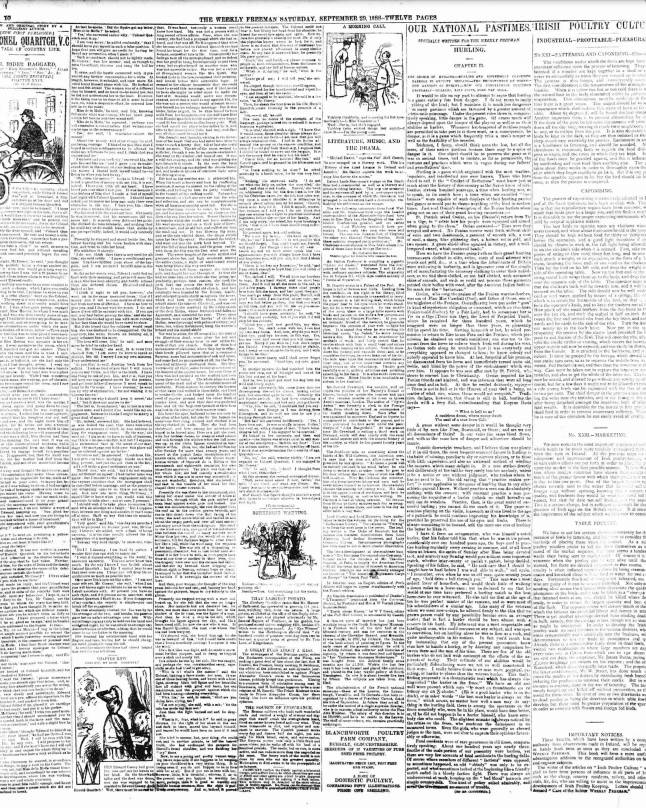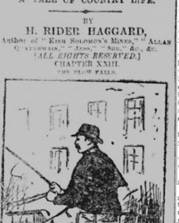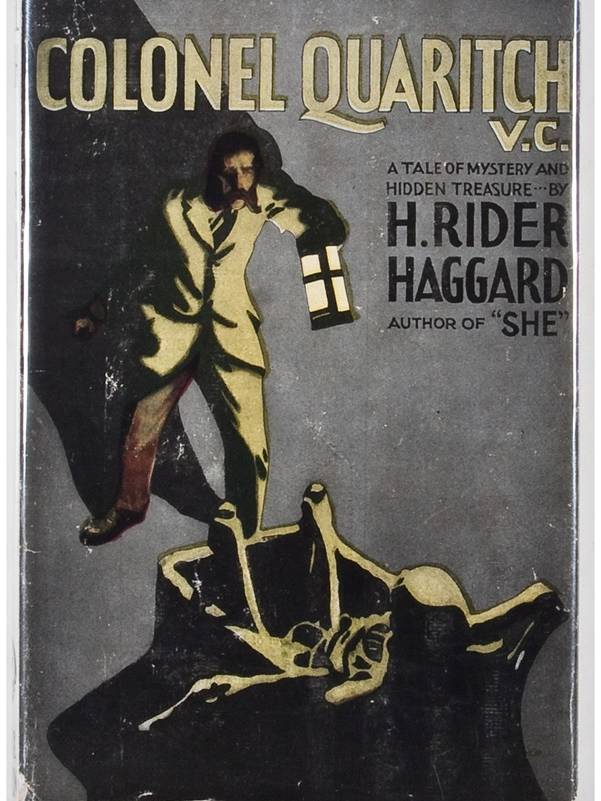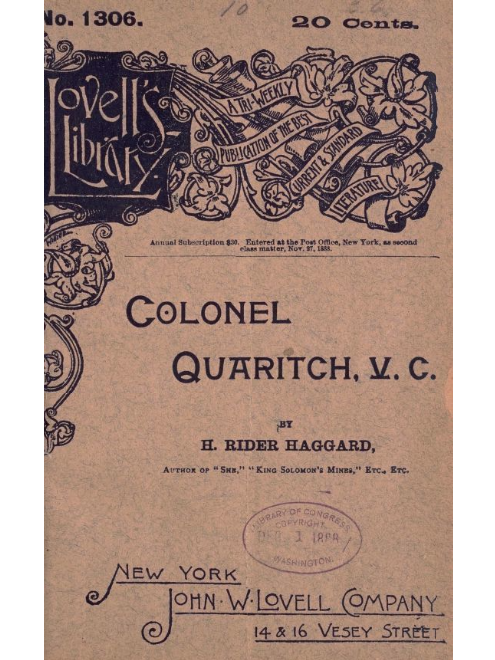Serialised fiction in the Bolton Weekly Journal – Colonel Quaritch V.C. (1888) by H. Rider Haggard
Colonel Quaritch V.C.: A Tale of Country Life (1887), is not the best-remembered H. Rider Haggard novel: one would have to concede that King Solomon’s Mines (1885) and She (1886) would vie for that accolade, both having been adapted for the big screen. However, the weekly periodical, Truth, reported in 1889 that the Sheffield Daily Telegraph called it “…one of the most powerful novels Mr. Haggard has written” (p.40). The story, first serialised in the Bolton Weekly Journal (June-November, 1888), is set in Norfolk, Haggard’s birthplace and concerns a retired army officer who takes over his deceased aunt’s home in the imaginary village of Boisingham, an hour by train from London. The plot, which melodramatically unfolds, concerns blackmail, scandal, murder and buried treasure; at the end of which, good, of course, triumphs over evil.
Another favourable contemporary review also quoted in Truth was from the Liverpool Mercury, who said that: “We regard this novel as reaching a higher level than any of Mr. Haggard’s stories” (1889, p.40). The Toronto Daily Mail likewise noted that it was “A serial of the most fascinating character from the pen of [the] prince of writers” (29 March, 1890, p.1) ; it is interesting to reflect that so notable an author, with several best sellers behind him, was still putting his faith in serialised fiction as the means by which to reach the greatest audience most swiftly, and presumably to stimulate sales of the novel when published at a later date. The Dublin newspaper the Weekly Freeman’s Journal was also serialising the “New and original story by a brilliant author” (September 29, 1888, p.10), with the curiously Holmes-like image of a hansom cab driver, as shown here.
Christopher Hilliard writes that “Late Victorian sensation fiction, the work of Mary Braddon, Wilkie Collins […] and their heirs worked for Tillotson because of the breadth of its appeal.” (2009, p.656), leading one to speculate whether H. Rider Haggard, the famous author of imperial, colonial themes, may have turned his hand to a sensation style of writing to fit in better with Tillotson’s expectations. She had been serialised in the Graphic magazine (1886-7), perhaps being considered too imperially colonial for the tastes of the wider readership of Tillotson’s Bolton Weekly Journal, as the North of England king of the serial story (just as Tess of the D’Urbervilles (1891) had been deemed too salacious for publication). Hilliard goes on to say that, unlike many other media groups of the era who aimed at specific gender or class audiences, Tillotson preferred to direct his gaze toward the broader church of mass appeal, and this required, for instance, “careful management of the role of imperial settings in its fiction” (Hilliard, 2009, p.656). Perhaps then, the Haggard of the African adventure tale, with its heroes representative of colonial imperialism, tailored a narrative to fall more in line with the expectations of his prospective promoter. When we consider the abundance of critical responses are in “publications beginning in the late 1980s [that] highlight the complicated and often ambivalent nature of Haggard’s relationship with imperial discourse” (Hultgren, 2011, p.645), it is clear that the topic most associated with this author does not have an overt connection with Colonel Quaritch V.C.: A Tale of English Country Life. At the same time, we must acknowledge that many of the central features of sensation fiction: murder and blackmail, do indeed appear in this novel. Its breadth of appeal can be judged by the fact that newspapers, from Toronto to Dublin to Sheffield and beyond, were waxing lyrical about the standard of writing Haggard produced in this novel.
Bibliography
Anon. (1890) Colonel Quaritch. Toronto Daily Mail. [Online] 29 March, p. 1. Available at: <https://www.britishnewspaperarchive.co.uk/viewer/bl/0002933/18900329/390/0001> [Accessed 19 March 2021].
Anon. (1889) Colonel Quaritch, V.C. Truth. [Online] 16 May, p. 40. Available at: <https://www.britishnewspaperarchive.co.uk/viewer/bl/0002961/18890516/114/0040> [Accessed 14 March 2021].
Anon. (1920) H. Rider Haggard’s Colonel Quaritch, V.C. A Tale of Mystery and Hidden Treasure. London: Hodder and Stoughton. Later edition. Octavo. Publisher’s binding and dust jacket. [Online image] Available from: <https://historical.ha.com/itm/books/fiction/h-rider-haggard-colonel-quaritch-vc-london-hodder-and-stoughton-1920-later-edition-octavo/a/201126-91057.s> [Accessed 17 March 2021].
Haggard, H. R. (1888) Colonel Quaritch, V. C. [Online] New York. John W. Lovell Company. Available from: <https://www.loc.gov/resource/dcmsiabooks.colonelquaritchv00hagg/?st=gallery> [Accessed 14 March 2021].
Haggard, H. R. (1888) Colonel Quaritch, V.C.: A Tale of Country Life. Weekly Freeman’s Journal. [Online] 29 September, p. 10. Available from: <https://www.britishnewspaperarchive.co.uk/viewer/bl/0001446/18880929/154/0012> [Accessed 18 March 2021].
Hilliard, C. (2009) The Provincial Press and the Imperial Traffic in Fiction, 1870s-1930s. Journal of British Studies [Online] 48(3), pp. 653–673. Available from: <www.jstor.org/stable/27752574> [Accessed 14 March 2021].
Hultgren, N. E. (2011) Haggard Criticism since 1980: Imperial Romance Before and After the Postcolonial Turn. Literature Compass [Online] 8(9), pp.645-659. Available from: <https://doi-org.ezproxy.bolton.ac.uk/10.1111/j.1741-4113.2011.00827.x> [Accessed 14 March 2021].














